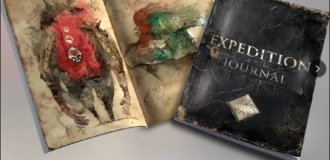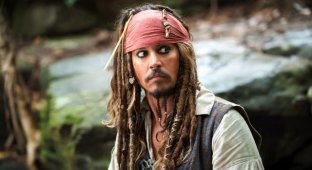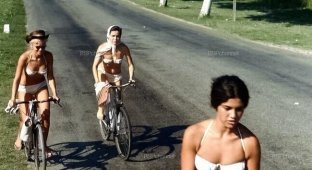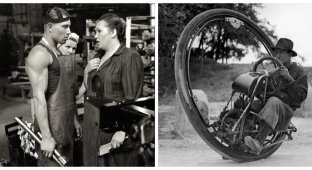Johnny Depp - a rock musician who accidentally became a movie star (25 photos)
For aesthetes, he is William Blake from “Dead Man,” for nonconformists, he is Raoul Duke from “Fear and Loathing in Las Vegas,” and for everyone else, he is Jack Sparrow from “Pirates of the Caribbean.” 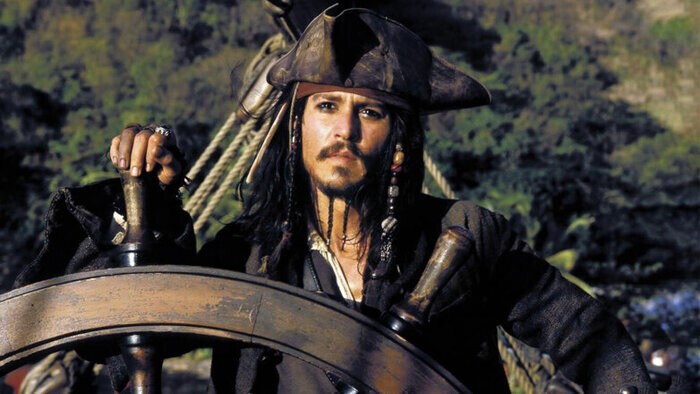
In recent years, this universally beloved, handsome and seemingly completely conflict-free person has unexpectedly become a symbol of resistance to cancel culture, a terrible scourge that has engulfed Western society. However, Johnny’s life was already full of surprises, because he had no plans to act in films, much less become a blockbuster hero.
By rock and roll
Depp belongs to that category of stars who were brought into the film industry by chance, and not by artistic ambition. Such were, for example, Alain Delon and Lino Ventura. 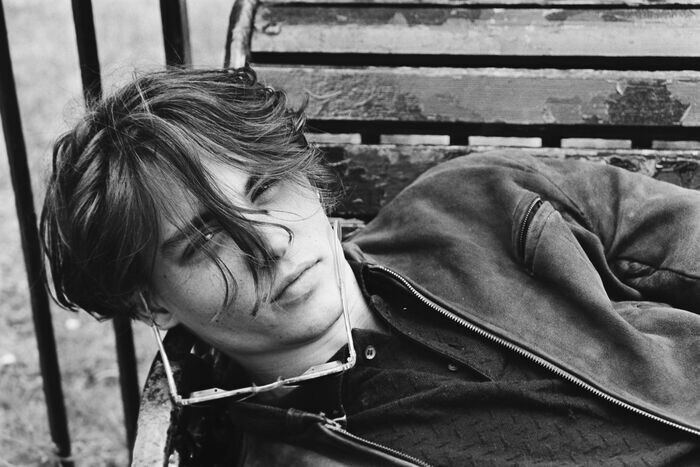
Johnny, the fourth child of engineer John Depp and waitress Betty Palmer, was on his way to becoming a rock star. For this reason, he dropped out of school and went to great lengths. Johnny's childhood and youth were already turbulent: his parents divorced, and Betty was overcome by “wanderlust” - before our hero left home, the family, according to his calculations, moved about 40 times. This intensified the feeling of chaos that reigned in the teenager’s soul, and Johnny early learned to extinguish it with alcohol and drugs.
Our hero's band was called The Kids, and they managed to achieve some fame in Florida, opening for real stars - the Ramones, Talking Heads and Iggy Pop. Depp later crossed paths with the latter more than once. 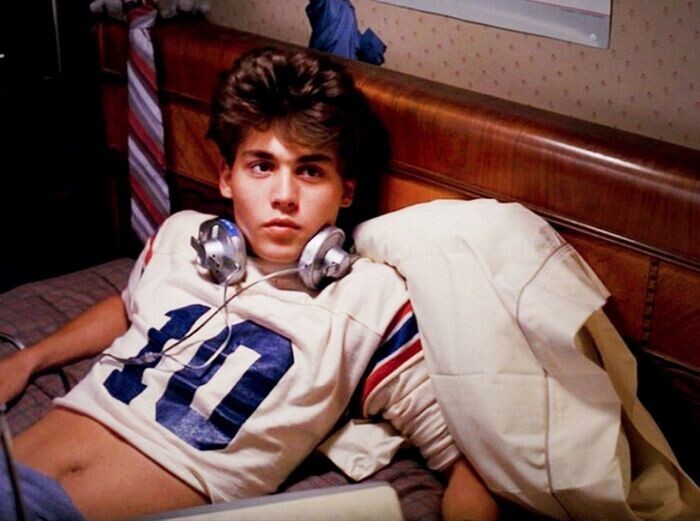
In pursuit of fame, Johnny and his friends moved to Los Angeles, where Depp soon married the sister of his band's bassist, Laurie Ann Alison. She was five years older than Johnny and, unlike her husband, quickly found her place in show business, becoming a popular makeup artist among movie stars.
Holiday on Elm Street
While Johnny was unsuccessfully fretting the strings in tiny clubs, Laurie was making useful contacts. Thanks to her, Depp became close friends with Nicolas Cage, the young nephew of director Francis Ford Coppola, who had just starred with Mickey Rourke in his uncle's film Rumble Fish (1983). Cage began to convince the rocker, who was languishing in obscurity, to try his hand at films and eventually dragged him to the casting for Wes Craven's A Nightmare on Elm Street (1984). Depp was hoping to get some small work, the fee for which would allow him to not stretch his legs from hunger for some time. But the result exceeded expectations: for his beautiful eyes, Depp, who had no acting experience, was given a prominent role as the boyfriend of the main character. 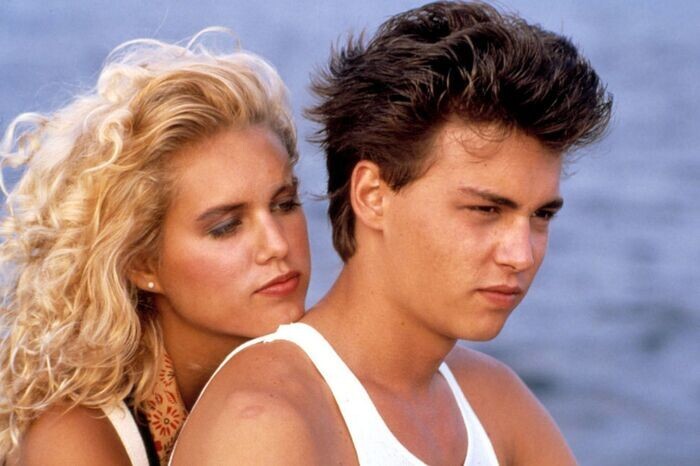
Life turned in a direction not foreseen by Depp: “Nightmare” became one of the most popular horror films of the 1980s, and Johnny received an offer to play one of the main roles in the erotic comedy “Private Resort” (1985). Thousands of his peers flocking to Hollywood studios would have gone crazy with such luck, but Depp stubbornly held on to his guitar and considered movies to be temporary hackwork. Although, in order not to go wrong with this hack job, he began taking stage acting lessons.
But it’s a shame: the musician’s career was not going well, but in the acting field everything was going like clockwork. In 1987, Depp landed the lead role of Tom Hanson, a young undercover detective, in the television series 21 Jump Street, which made him an American teen idol. For three years and four seasons, the hero Johnny investigated crimes in schools and colleges, and I think around this time Depp said goodbye to his dream of becoming a rock idol. “You get paid good money to make faces and pretend to be someone else,” Johnny said about his acting. Not such a bad job after all.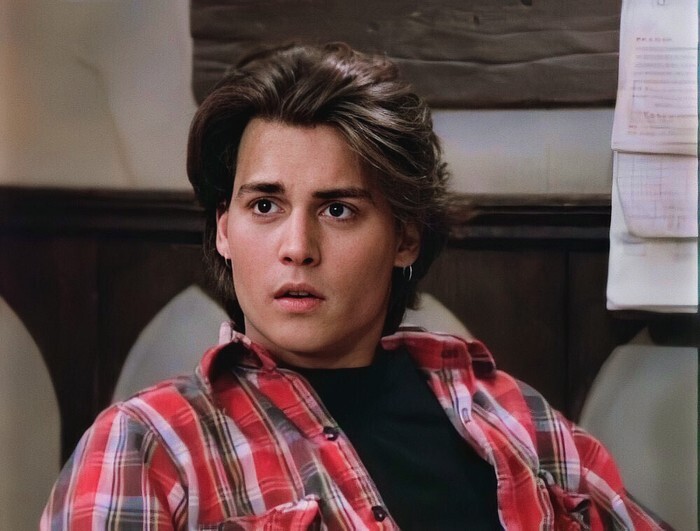
Independence Days
Accepting the fate of a movie star as something inevitable, Depp almost simultaneously played leading roles in the films of two cult directors - John Waters in “Cry-Baby” (1990) and Tim Burton in “Edward Scissorhands” (1990).
It was risky to act with Waters: he was famous for his scandalous films, relishing the aesthetics of the ugly; invited real criminals and porn actors to play the roles. But “Cry-Baby” turned out to be a harmless musical, which only strengthened Depp’s reputation as a romantic handsome man and a favorite of girls. In addition, his idol Iggy Pop starred in the film along with Johnny. 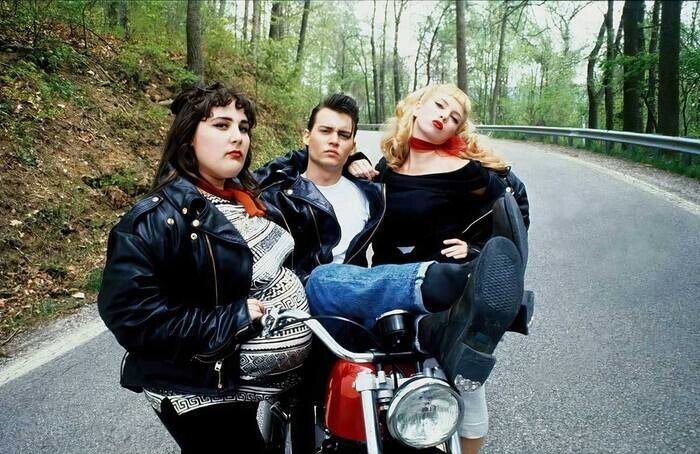
And after the release of Edward Scissorhands, Depp was declared the main rising star in Hollywood. The film marked the beginning of a long-term friendship and collaboration with Tim Burton, with whom Depp has now made nine films (including Ed Wood, Sleepy Hollow, Sweeney Todd, Alice in Wonderland) - more than with by anyone else.
“Arizona Dream” by Emir Kusturica, “Dead Man” by Jim Jarmusch, “Fear and Loathing in Las Vegas” by Terry Gilliam - thanks to these films in the 1990s, Depp became the handsome prince of independent cinema. Those were the years of the triumph of alternative rock in world pop music, and Depp looked like a kind of representative of alternative youth on the big screen. 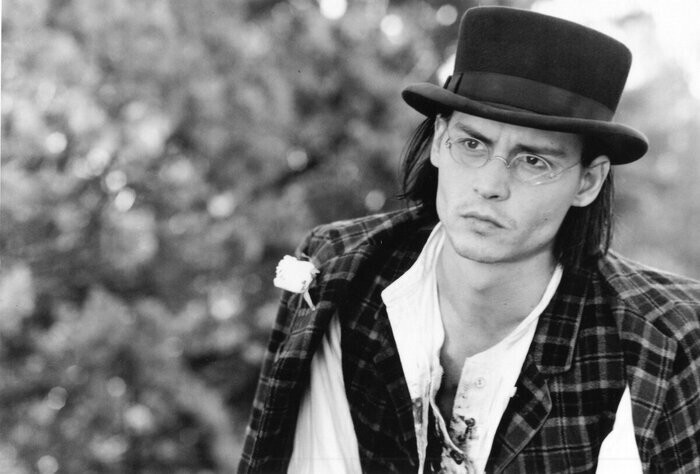
His rare forays into commerce did not end well, as in the case of John Badham's action film Last Minute (1995). The exception was the crime drama Donnie Brasco (1997) by Mike Newell, where Johnny made an excellent pair with Al Pacino.
Never say forever
Johnny's cute face was confusing. Some critics believed that he was nothing more than a fashion model lost in the wilds of auteur cinema. But Depp managed to put them to shame with the 1997 arthouse film Brave, slow and dark. 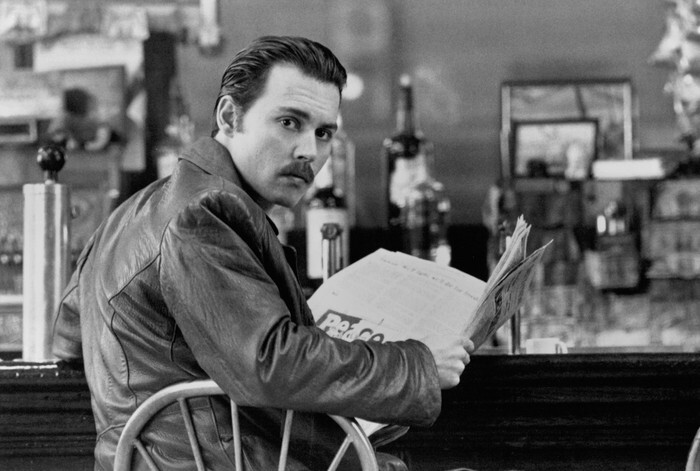
As for models, in the mid-1990s his friend and fellow carouser was the Englishwoman Kate Moss, for whom he left the beauty Winona Ryder (they met on the set of Burton), for whom he, in turn, left the beauty Sherilyn Fenn ( She is best known for her role as Audrey in Twin Peaks. Whatever the novel, Depp has a story for a glossy magazine. At the same time, Johnny was not a rake and always took relationships seriously. With Ryder, he planned love until the grave, in honor of which he tattooed the slogan “Winona forever” on his arm. After the breakup, however, it had to be remade into “Vaino (as they call drunks in America) forever.” This saying had a deep meaning, given Depp's eternal problems with alcohol.
But in the late 1990s, Moss also had to leave for the sake of a new love for the French singer and actress Vanessa Paradis, with whom he eventually lived for 14 years and who bore him two children: Lily-Rose Melody Depp and Jack. Lily-Rose now has her own acting career: she recently played the main role in the TV series “Idol”. 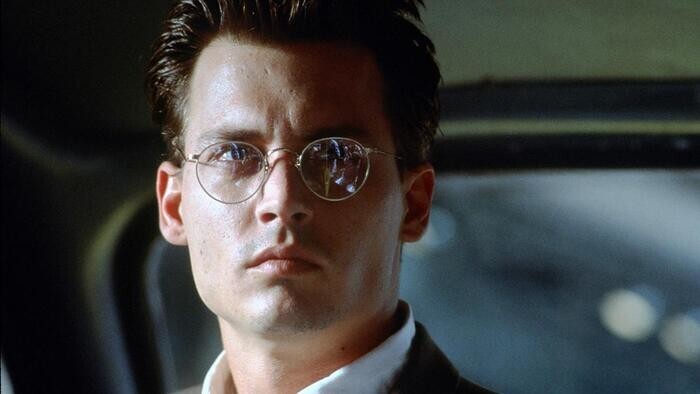
With all his sweethearts, from Laurie Ann Alison to Paradis, Depp remains on good terms, and they all supported the actor during the trials with Amber Heard, testifying: Johnny would never lay a hand on a woman.
Dead Man's Chest
But before those trials began, and before Depp even knew about Amber Heard's existence, he had gone from alternative prince to blockbuster king, all thanks to his role as Jack Sparrow in Disney's Pirates of the Caribbean franchise. From 2003 to 2017, five of its parts were released, the total box office receipts of which amounted to $4.5 billion. The actor himself earned about $200 million from the project. 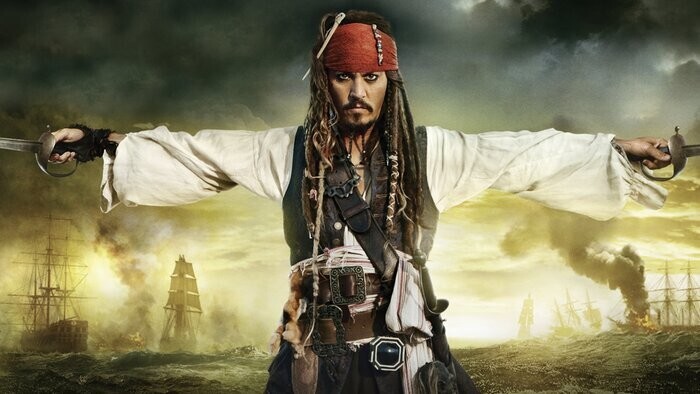
At first, Disney didn't really trust Depp. They wanted to give the role of Jack Sparrow to Hugh Jackman or Jim Carrey. When Johnny presented his version of the pirate captain, Disney bosses were perplexed: “Why is he so strange? Do you want to show that he is gay or that he is always under attack? In fact, Depp copied Jack’s loose gait and mannerisms from his older comrade, The Rolling Stones guitarist Keith Richards, because, having studied the history of pirates, he came to the conclusion that they were “rock stars of their time.”
Explaining why he took on this overtly commercial project in the first place, Johnny said: “My young children were one of the main reasons I agreed. I wanted to be in a film that they could watch. After all, to evaluate Fear and Loathing in Las Vegas, they would have to wait fifteen, or even twenty years.” 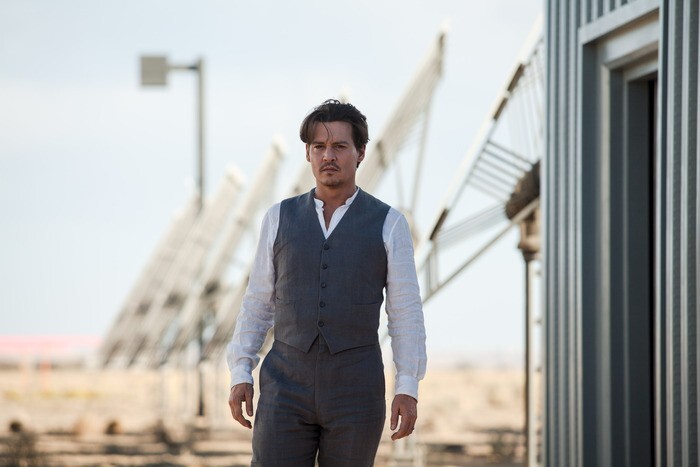
Under the dark shadow
The success of “Pirates” had a downside: from now on, box office receipts became the main criterion for evaluating films with Depp in the eyes of the mass audience. But against the background of the Caribbean franchise, almost any fees looked modest, so Johnny risked becoming a hostage to one damned role. Resisting this, he fought with all his might, choosing larger projects. At first, everything went well, and in the early 2010s, Depp appeared in the Guinness Book of Records as the highest paid actor in the world.
But with “Dark Shadows” (2012), his next collaboration with Tim Burton, a streak of commercial failures began in the actor’s career: “The Lone Ranger” (2013), “Transcendence” (2014), “Into the Woods” (2014), “Mortdecai” (2015) – all these films barely broke even at the box office, and only compliments from critics for his performance in “Tusk” (Johnny’s short return to independent cinema) and “Black Mass” saved Johnny from complete despondency. 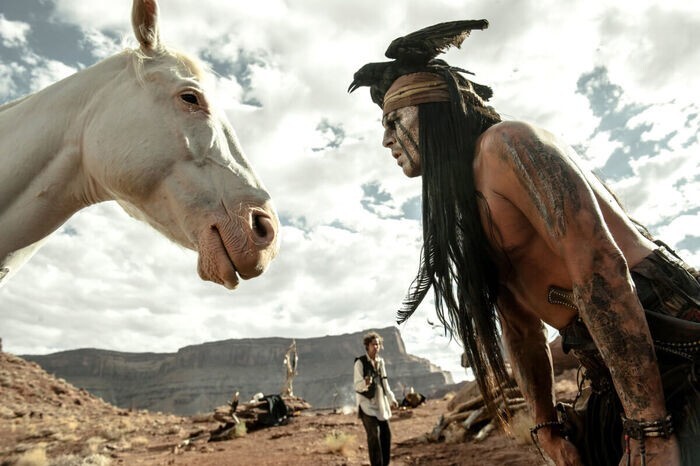
He couldn’t generate good box office returns, but he could still surprise—for example, with his radical transformation into Donald Trump in the political satire “Donald Trump: The Art of the Deal” (2016), which anticipated the victory of the famous billionaire in the US presidential election. The newspapers wrote: “Who would have thought that Trump was exactly the role that Depp needed for a good comeback?”
And a comeback was indeed in sight: Johnny performed successfully in the remake of “Murder on the Orient Express” (2017) by Kenneth Brannagh, two parts of “Fantastic Beasts” (a spin-off of “Harry Potter”), and the fifth part of “Pirates” sold well, although and worse than the previous ones. But at this very time, Depp entered into a protracted series of scandalous proceedings with his ex-wife Amber Heard, and Hollywood studios, famous for their timidity, began to avoid working with Johnny. 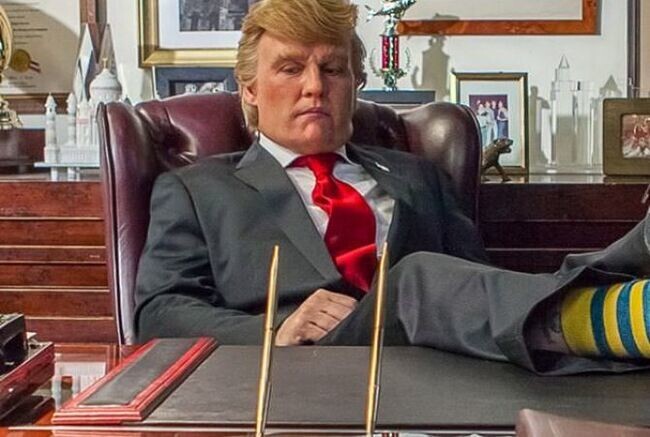
Rock knows how to wait
Despite the streak of failures, in 2015 Johnny began the most long-awaited role of his life - the role of a rock star. It was then that the supergroup Hollywood Vampires, whose core consists of Depp, Alice Cooper and Aerosmith guitarist Joe Perry, released their debut album and performed at one of the largest rock festivals in the world - Rock In Rio. The names of the guest musicians who participated in the recordings and performances of this band dazzled the eyes: Slash, Duff McKagan and Matt Sorum from Guns'N'Roses, Brian Jones from AC/DC, Robbie Krieger from The Doors, Geezer Butler from Black Sabbath, Marilyn Manson, as well as Sir Paul McCartney and the late Sir Christopher Lee.
Perhaps Depp’s vanity would have been more flattered if he had been seen primarily as a musician rather than as a guitar-playing movie star, but to his credit it must be said that he plays really well, not like his friend Kusturica, who performs at No Smoking Orchestra concerts function of the wedding general. 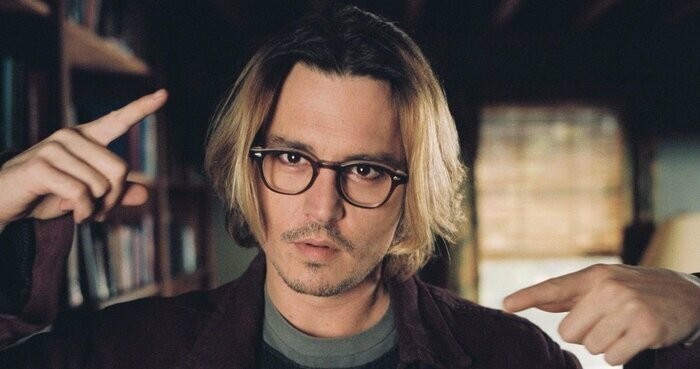
Depp's guitar can be heard, for example, in the song The Snake on the album That Woman's Got Me Drinking by the great Irish drunkard Shane MacGowan and his band The Popes, in the song Fade In-Out by Oasis, in the composition You're So Vain from Marilyn Manson's album Born Villain.
Johnny’s most significant musical product was the album released last year called “18” - a collaboration with British guitar virtuoso Jeff Beck. In addition to cover versions of famous songs - from the Velvet Underground's Venus In Furs to John Lennon's Isolation - this album also contains a couple of compositions that Depp himself had a hand in composing. 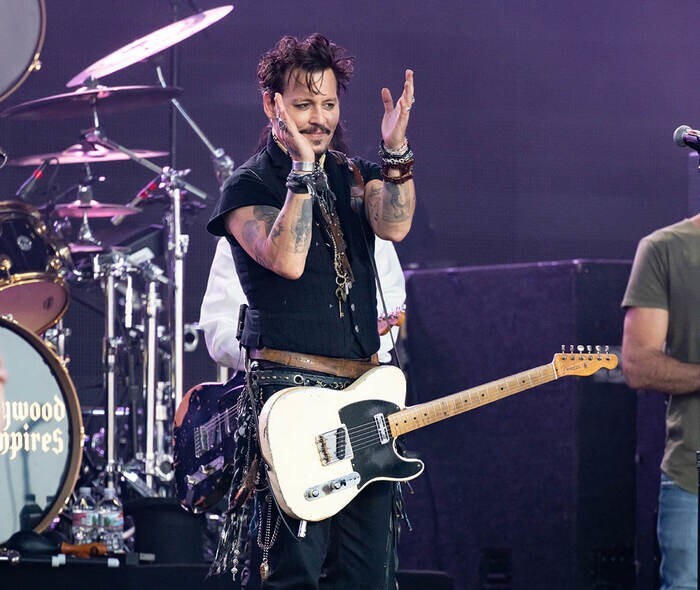
Monument during life
Depp knows how to be friends with interesting people, and it doesn’t bother him that in these relationships he is usually the younger one, the student. The choice of friends suggests that Johnny is consistently drawn to those who are commonly called rebels.
On the set of Don Juan de Marco (1995), Depp became friends with Marlon Brando. Johnny was impressed by this titan's critical attitude towards the film business, and Brando, seeing Depp as a younger brother in mind, gladly taught him how to behave in the serpentarium called Hollywood. Johnny directed the grand old actor in his film "Brave." “Marlon was one of the funniest people I knew,” Depp later recalled. 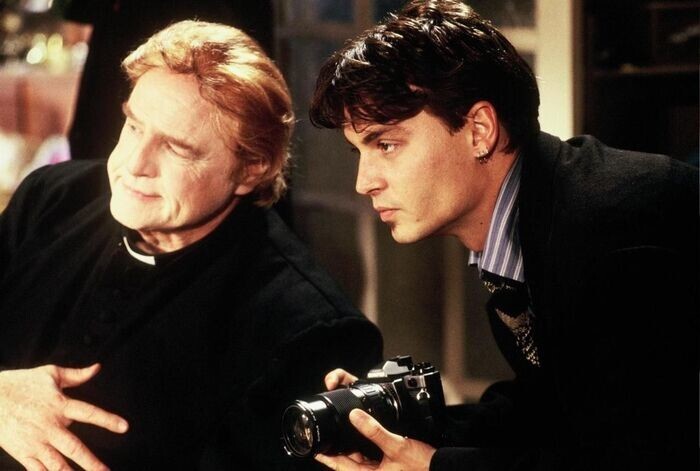
Colonel Depp
Depp's friendship with the desperate writer and father of gonzo journalism Hunter Thompson, whom Johnny played in two films: Fear and Loathing in Las Vegas and The Rum Diary, became legendary. They met in the mid-1990s and became so close that Thompson saw his alter ego in the young man. He became convinced that no one better than Depp could play the main character of Fear and Loathing, that is, himself. Hunter respectfully referred to his younger friend as “Colonel Depp,” although in the adventures and antics for which Thompson was famous, Johnny was more like his faithful aide-de-camp. Both emphasized the fact that they were natives of the state of Kentucky, a characteristic feature of which was the unintelligible Kentucky accent characteristic of both Thompson and Depp. 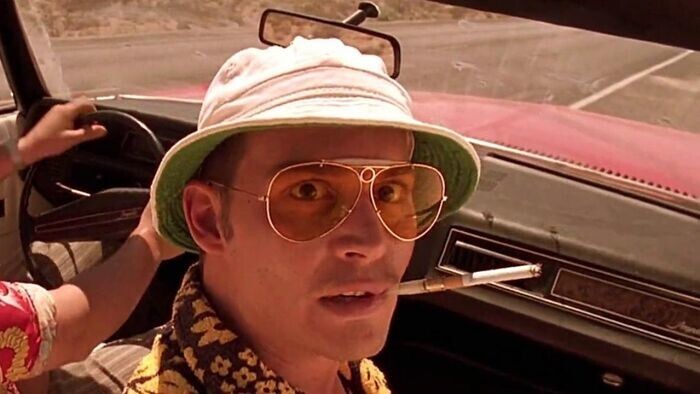
It was Johnny who took upon himself the costs of making the writer’s last wish come true: he bequeathed to scatter his ashes with a shot from a 32-meter cannon.
Taking advantage of his influence, Depp tried to get his friends into the movies in one way or another. This is how Keith Richards and Paul McCartney got roles in Pirates of the Caribbean. In addition, about 10 years ago, Depp was going to make a documentary about his friend Keith called “Happy,” but the project somehow stalled. 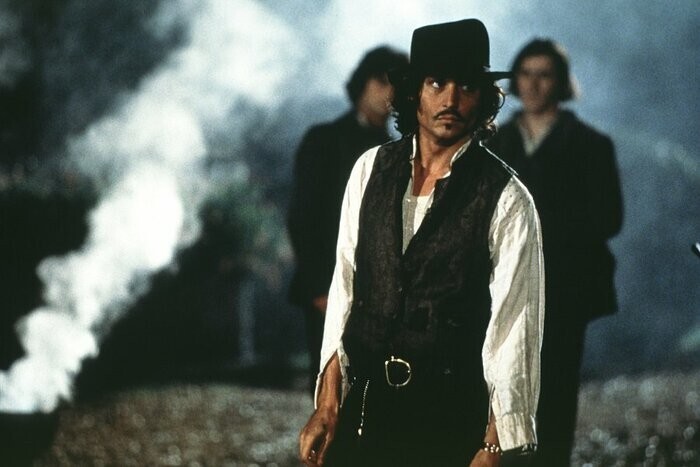
But Depp did make a film about another sidekick musician, the inimitable and tireless Shane MacGowan, leader of the bands The Pogues and The Popes. It was released in 2020 and is called “Pot of Gold: A Few Drinks with Shane MacGowan.”
Depp has no shortage of either. And the support of friends turned out to be quite useful when, against the backdrop of litigation with Amber Heard, Hollywood decided to “cancel” Depp. 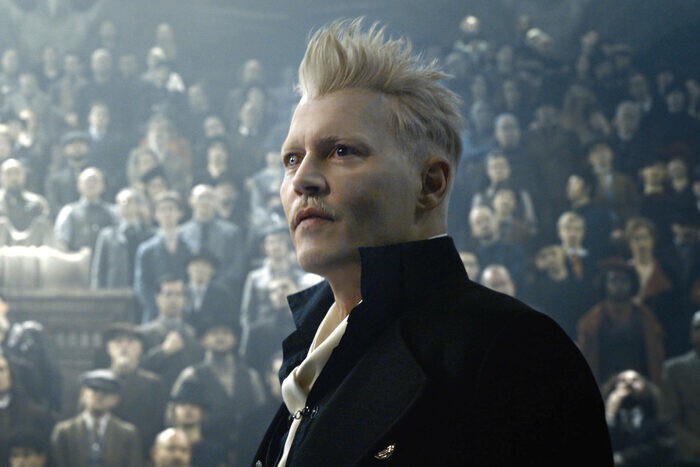
Down from the top
As the years pass, all of Depp’s failures look like links in one chain: his acquaintance and affair with Heard, failed films, then lawsuits with his ex-wife and a boycott of major Hollywood studios. It’s as if fate decided to test Johnny’s strength or, rather, return our hero from the glamorous Olympus to his place, reminding him that he is not a money bag, but an independent person who does not care about Hollywood vanity fair.
The confrontation between Amber Heard, who accused Depp of domestic violence, and Johnny, who proved his innocence, became one of the main events of the crazy era of cancel culture, the #meToo movement and the fight against “toxic masculinity.” It divided not only America, but the entire interested world into two camps: supporters of Heard as a symbol of an offended and humiliated woman, and supporters of Depp as a symbol of a humiliated and slandered man, another unjust victim of cancel culture. 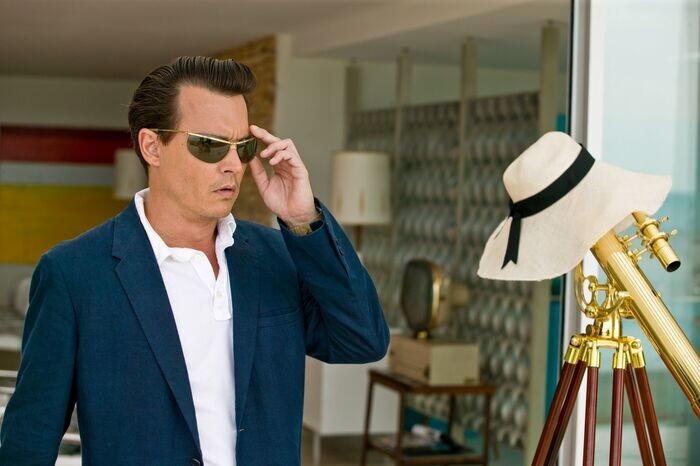
Johnny met Amber Heard on the set of The Rum Diary. At the time, Heard was in a relationship with a woman, photographer Tasya Van Ree. For the sake of Heard, 46-year-old Depp left Vanessa Paradis, but the marriage with Heard turned out to be very short-lived and certainly unhappy. In it, Depp, a favorite of women, turned from a handsome prince into an unhappy “daddy”, ready to fulfill any whim of his young wife. The stunned Johnny was deaf to the skeptical remarks of his old friends regarding this misalliance. A little over a year after the wedding, Heard filed for divorce and almost immediately initiated a lawsuit against Depp, accusing him of domestic violence.
Who is guilty
From the very beginning, many were alarmed by the timing of Heard's filing of the lawsuit - just a week after the death of Depp's mother, whom he was deeply worried about. There was no humanity in this, but for the monster Heard wanted to portray Depp as, it didn’t seem to be needed. The actress claimed that their family life was hell, her husband drank, took drugs and beat her in vain. She demanded that Depp be banned from approaching her, as well as a large sum as moral compensation. 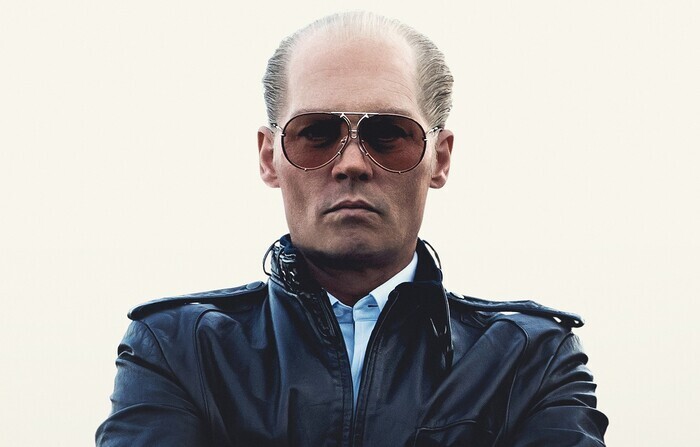
Many of his friends, colleagues and ex-wives spoke out in Depp's defense. They said that the behavior Heard described was completely out of character for Johnny. Amber’s evidence base was rather weak, and as a result, the parties soon agreed to settle the case. Depp agreed to give his ex-wife seven million dollars, which she pathetically promised to give to charity, which, as it turned out several years later, she did not do.
The case was not limited to just one court, and only in 2022 did Depp manage to prove that the accusations made by Heard were slander. But by that time it became clear that cancel culture does not work in the opposite direction and no one cares about excuses in this system. Over several years, a lot of evidence has accumulated that if there was an injured party in this marriage, it was Depp: Heard cheated on her husband, insulted him and, yes, engaged in assault. But this evidence didn't stop the tabloids from labeling Depp a "wife-beater," Warner Bros. to terminate the contract with the actor, and Netflix to bless the ridicule of Johnny as an abuser in the animated series “Paradise Police”. 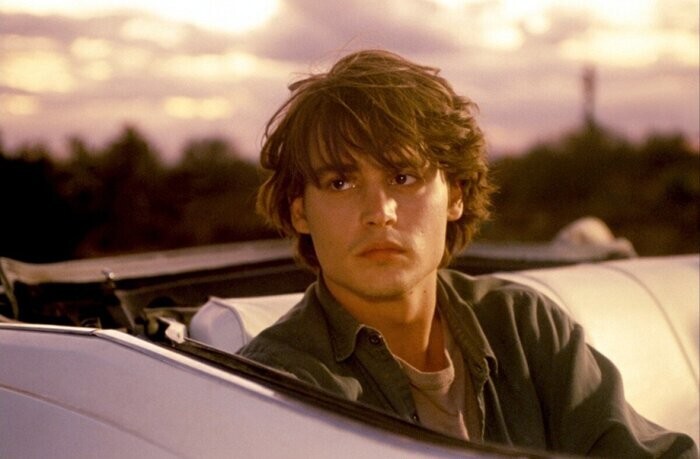
Fake Indian
Depp experienced other signs of the times, for example, accusations of “cultural appropriation” from particularly concerned American Indians.
At first, some of them did not like that Johnny, in an interview, explained his Mongoloid features by the presence of Indian blood. Just half a century ago, ethnic minorities would have said, “How nice, he’s one of us.” But times have changed, and now to classify oneself as an Indian without having accurate genealogical confirmation (which Johnny really does not have) means to be an impostor. 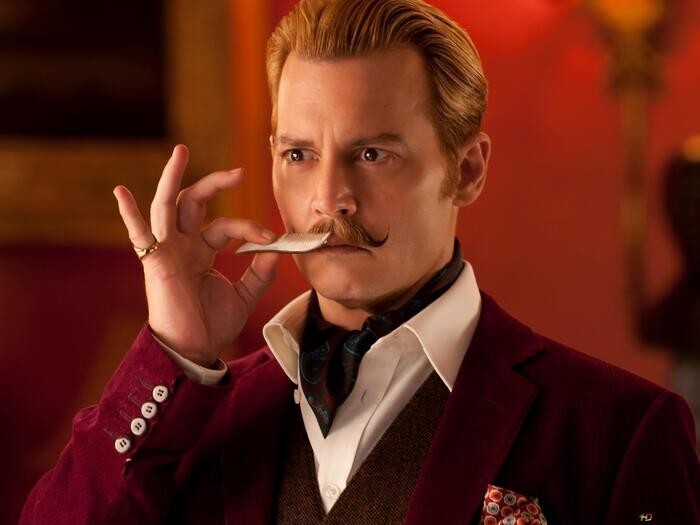
The debate then turned to Gore Verbinski's The Lone Ranger (2013), in which Depp played Tonto, the Lone Ranger's companion. Some criticized the Disney company for allowing a white man to play the role of an Indian - in the world of political correctness, this, it turns out, is absolutely impossible to do. It’s scary to think what all these people would say about the Yugoslav Gojko Mitic, the idol of Soviet boys.
Others have gone even further, saying that Tonto himself is a caricature of the indigenous people of America, degrading them. And particularly inquisitive activists, having combed through Depp’s biography, discovered the actor’s involvement in a musical project with the outrageous name “Giant Tonto Nuts” (in English the word nuts, literally nuts, is a slang name for testicles) - his songs can be found on the soundtrack to the Robert Rodriguez film “Once Upon a Time” in Mexico" (2003). 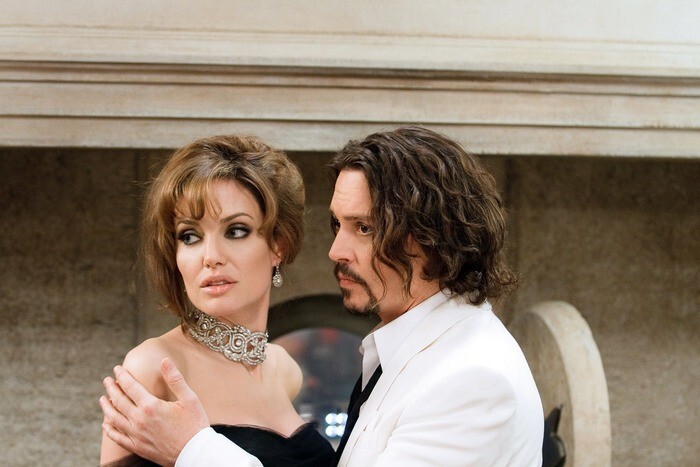
If at the beginning of the 2010s the noise around offended minorities was still just noise, then by the end of the decade, the offended of all sorts and kinds became filled with strength and power. And if Depp got away with “Tonto nuts,” then in 2019, an advertisement for Dior’s Sauvage perfume was hastily removed after accusations of cultural appropriation and even racism. The sedition was that shots of Johnny thoughtfully walking through the mountains were interspersed with scenes of Indian ritual dance.
Don't care about Hollywood
Fortunately, America, with its Hollywood and the grimaces of political correctness, is not the whole world. This spring in Cannes, at the premiere of the film “The Favorite” (“Jeanne Du Barry”) directed by Maiwenn Le Besco, in which Depp played King Louis XV, he was given a seven-minute ovation. 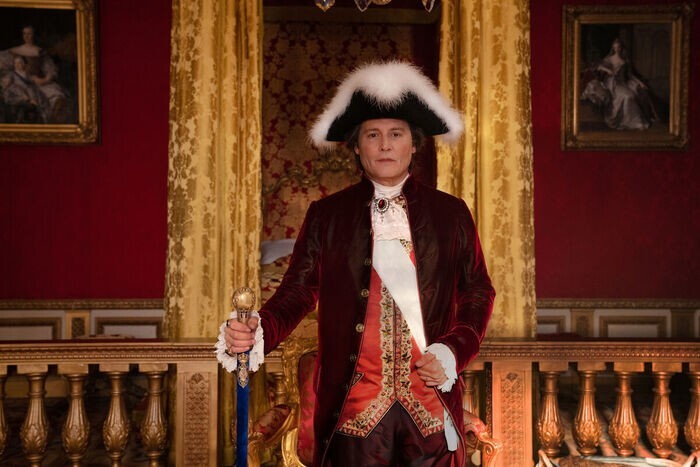
On the threshold of his 60th birthday, Depp seemed to return to his youth, when he was more concerned about the artistic merits of the project and independence than box office receipts and the favor of Hollywood bigwigs. For many, the “real Depp” remained in the 1990s, and perhaps there is a silver lining – he is returning at the instigation of Amber Heard and the Hollywood “cancellers”.
However, there are rumors about Johnny’s participation in the sixth part of “Pirates of the Caribbean”. Disney refutes them, but the company is clearly in a difficult situation: they really want to make big money, and the Pirates project without Depp risks failing miserably. In this situation, Johnny seems not to play at all, answering a question about the Hollywood boycott at Cannes: “I don’t think about Hollywood, I don’t need it.”










